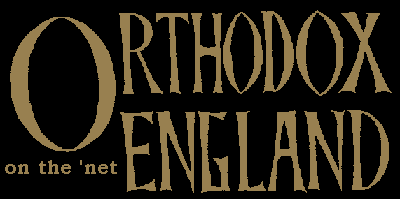
![]()
Excerpt
from: Volume 6 Issue 4 Date 1st June 2003
![]()
Editorial:
CHRIST AND EUROPE
The first main article in this issue of Orthodox England was written by
a contemporary Orthodox Saint, St Justin of Chelije (1894- 1979). The
second relates the life-story of an almost contemporaneous figure, the
Catholic academic genius, Christopher Dawson (1889-1970). At first sight,
these two figures would appear to have nothing in common. However, it
is our belief that across the cultural barriers they share a deep spiritual
likeness.
Had they known one another, they would surely have found that in many ways they complemented one another. On the one hand, the Orthodox Saint clearly understood the apocalyptic errings of contemporary Europe, the origins of which he traced back to 'the tenth century after Christ' (in the words of the Western philosopher Spengler). On the other hand, the Catholic scholar understood that those same suicidal errings could only be corrected if Europe returned to its Christian roots. Although the scholar belonged to a generation which was conditioned to identify those roots with Catholicism, it is our belief that at the end of his life, he was about to realise that those roots are in fact to be better identified with the Orthodox Church.
The first article consist of extracts from 'Humanist and Divino-Human Culture', a chapter from the book The Orthodox Church and Ecumenism. Written by St Justin, the renowned Serbian theologian then known as Archimandrite Justin Popovich, it is taken from the translation in Orthodox Life No.4, 1984 by Stephen Karganovic. Fr Justin, born on the Feast of the Annunciation 1894 and reposing on the same Feast in 1979, was a highly cultured man who spoke several European languages. Having studied in both Russia and England before the end of the First World War, he was later to endure persecution from Nazi and Communist Europe alike. In his much-suffering and much-betrayed Serbia, he knew Europe only too well.
The essence of his thought may be summed up simply by his knowledge that true Christianity in the West had been deformed by the filioque ideology. Unlike the Old Orthodox West, the filioque West is devoted not to the worship of Christ, the God-Man (in Greek, Theanthropos), but to the worship of man (in Greek, Anthropos) in the ideology of humanism (in Greek, Anthropismos). As Orthodox Christians, we cannot be humanists, which is the worship of fallen man and therefore the worship of sin. Fr Justin wanted the world to understand this and to replace the worship of sinful man with the worship of Christ, the sinless God-Man, Who is the Head of the Church. Fr Justin' s writings are of particular interest to us because he wrote of Europe.
For the Orthodox Tradition, the word 'Europe' is a word of menace, of danger. Thus for example, for European countries like Serbia, Greece and Russia, 'Europe' is the place from which everything bad has come. This is most significant, for there is no natural frontier between 'Europe' and European countries like Serbia, Greece and Russia, but there is a spiritual one.
Now England is a country which, though also European, also has a detached view of Europe. After all, it was from Europe and its pernicious ideologies that the Norman Invaders, the Armada, Napoleon and both World Wars came, dragging this country down with them. Here, however, the frontier is sadly not so much spiritual as merely geographical, and England has much too often been part of the 'Europe' which is 'counter-Christian', i.e. anti-Orthodox.
Perhaps it is only a hope, but it would be good to think that at least some English people might read Fr Justin's writings with the Orthodox understanding that the Europe of today is therefore not so much a place, but rather a spirit - a humanistic spirit alien to the Orthodox Church of Christ the God-Man. Moreover, there was once another Europe, the Orthodox Europe of a thousand years ago, before 'the tenth century after Christ', to which Christopher Dawson belonged in spirit, and which St Justin recognises and mentions, and to which we Western Orthodox all spiritually belong.
Perhaps, God willing, there will one day
be another Europe, the Orthodox Europe of a thousand years to come, to
which we Western Orthodox already spiritually belong. The choice for now,
however, is clear. It is in Blessed Justin's words: the Christ-centred
Orthodox Church or man-centred Europe.
We believe that there are a great many people of goodwill and faith like
Christopher Dawson, sincere, pious and righteous people, who, though not
members of the Orthodox Church, are on the side of the angels in this
struggle. If they fail to go back beyond the Reformation, if they fail
to recognise that the Orthodox Church is the last bastion in this great
struggle, it is not necessarily their fault, but rather the fault of us
Orthodox Christians in not witnessing to them.
Today's struggle is indeed 'Christ or Europe?' But the most useful weapon that we possess is the knowledge that there was a time of 'Christ and Europe'. Christopher Dawson knew it and wanted to live it. We too who live in Europe, must learn this, preach this and live this. We start today.
Fr Andrew
(c) Orthodox England - Published within the English Deanery of the Church Outside Russia: with the blessing of the Very Reverend Mark, Archbishop of Great Britain and Ireland.